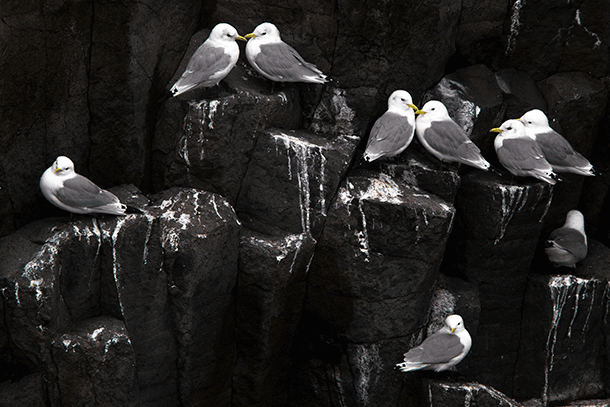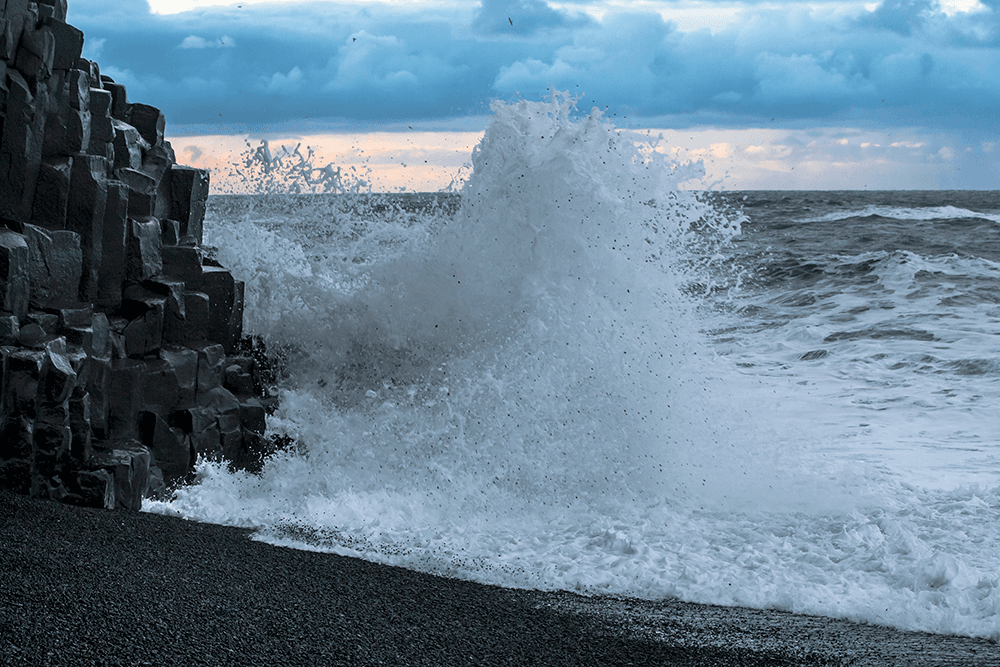‘How beautiful, the way life hangs on. How brave it is to live.’
Waves dash the clifss on Snaefellsnes Peninsula, Iceland.
Living on Earth's explorer-in-residence Mark Seth Lender visited Iceland and found Black-Legged Kittiwake daring to nest right on the cliffs, despite the wild waves lashing the shore below. These are his impressions:
Lava works its way down, steams and smokes and spits as it meets cold water. Then, wears away, retreating inland till only the core remains: Black basalt crystalized in octagons like giant’s teeth, a long wall grinning and gnashing towards an ancient sea, while the sea grins back.
Waves are its teeth, its tongue spray and foam. It puts the bite like Viking iron upon the stone, chafing and gnawing. Pebbles that would bed rock leap as the breakers crash, roll like rainfall into the trailing spume: husssssh as the sea flows out; wusssssh, as the sea flows in.
Small and small the ocean grinds volcanoes into sand. Ashes to ash, smoke to dust. Until once more the molten rock, and the landward side puts its shoulder to the task. Above this maelstrom, white traces the midnight rock like paint.
Kittiwake, clinging to their narrow ledges, where the basalt cleaved away, their dark eyes, their black feet joined to this black place, until they spread their wings.

Swooping like reckless kites down toward the gaping hunger of the sea. Then up, and through the surge on a rollercoaster of thin air, a pleasure in the peril. What else could it be?
They cannot fish when the water is angry like this and here it is angry all the time. They take a risk. The ocean reaching beyond its reach will knock them down. The fishes, coming from a line that is older (older than any of this), wisely lie beyond the turbulence. Kittiwake, though they know where fish hide and where to find, instead put self (and therefore progeny) in harm’s way.
Maybe risk is what it’s all about, and the birds are only reminding themselves: Life does not belong here. Iceland, hovering over the howling place where the Earth to its innards is split in two, the fire, patient, waiting for the break-through, flexing its molten fingers until it reaches out, as the sea reaches for sea birds.
How beautiful, the way life hangs on. How brave it is to live.
This article is based on a story that aired on PRI's Living on Earth with Steve Curwood.
Living on Earth's explorer-in-residence Mark Seth Lender visited Iceland and found Black-Legged Kittiwake daring to nest right on the cliffs, despite the wild waves lashing the shore below. These are his impressions:
Lava works its way down, steams and smokes and spits as it meets cold water. Then, wears away, retreating inland till only the core remains: Black basalt crystalized in octagons like giant’s teeth, a long wall grinning and gnashing towards an ancient sea, while the sea grins back.
Waves are its teeth, its tongue spray and foam. It puts the bite like Viking iron upon the stone, chafing and gnawing. Pebbles that would bed rock leap as the breakers crash, roll like rainfall into the trailing spume: husssssh as the sea flows out; wusssssh, as the sea flows in.
Small and small the ocean grinds volcanoes into sand. Ashes to ash, smoke to dust. Until once more the molten rock, and the landward side puts its shoulder to the task. Above this maelstrom, white traces the midnight rock like paint.
Kittiwake, clinging to their narrow ledges, where the basalt cleaved away, their dark eyes, their black feet joined to this black place, until they spread their wings.

Swooping like reckless kites down toward the gaping hunger of the sea. Then up, and through the surge on a rollercoaster of thin air, a pleasure in the peril. What else could it be?
They cannot fish when the water is angry like this and here it is angry all the time. They take a risk. The ocean reaching beyond its reach will knock them down. The fishes, coming from a line that is older (older than any of this), wisely lie beyond the turbulence. Kittiwake, though they know where fish hide and where to find, instead put self (and therefore progeny) in harm’s way.
Maybe risk is what it’s all about, and the birds are only reminding themselves: Life does not belong here. Iceland, hovering over the howling place where the Earth to its innards is split in two, the fire, patient, waiting for the break-through, flexing its molten fingers until it reaches out, as the sea reaches for sea birds.
How beautiful, the way life hangs on. How brave it is to live.
This article is based on a story that aired on PRI's Living on Earth with Steve Curwood.
The story you just read is accessible and free to all because thousands of listeners and readers contribute to our nonprofit newsroom. We go deep to bring you the human-centered international reporting that you know you can trust. To do this work and to do it well, we rely on the support of our listeners. If you appreciated our coverage this year, if there was a story that made you pause or a song that moved you, would you consider making a gift to sustain our work through 2024 and beyond?
